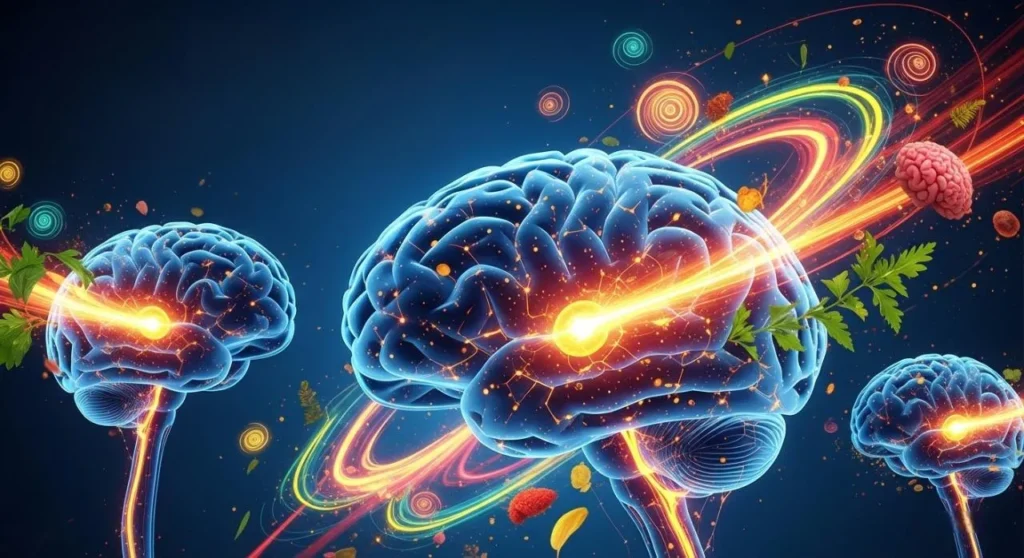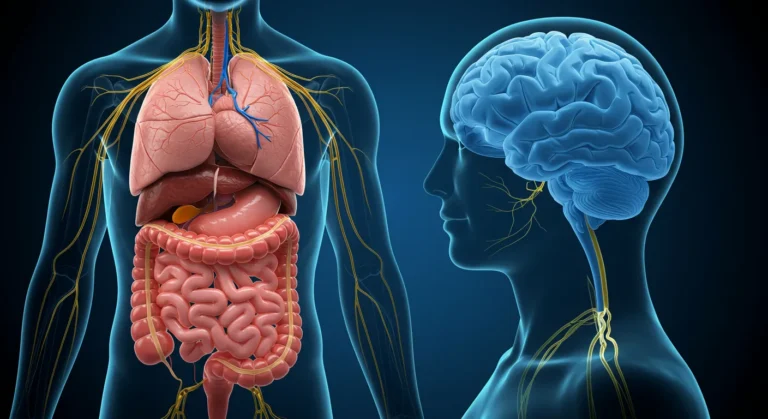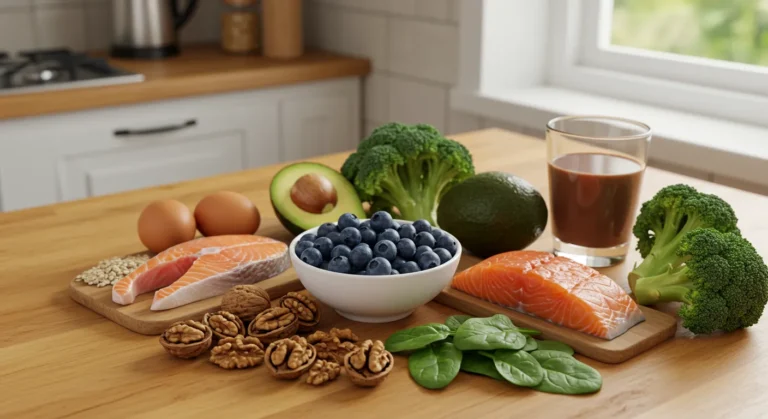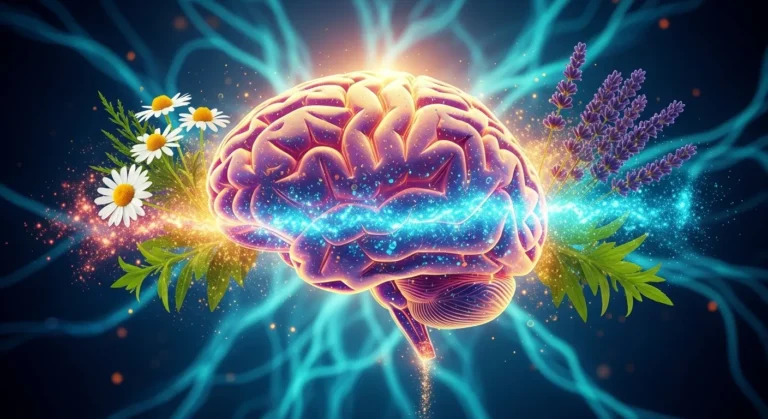7 Best Herbs for Brain Health to Boost Memory and Focus Naturally

Ever find yourself walking into a room and completely forgetting why you went there? Or struggling to focus during that important afternoon meeting? You’re not alone. In our hyperconnected world, our brains are constantly bombarded with information, leaving many of us feeling mentally foggy and scattered.
Here’s the thing: while we can’t escape the demands of modern life, we can give our brains the support they need to thrive. Ancient wisdom meets modern science in the world of brain herbs – natural compounds that have been enhancing cognitive function for thousands of years, now backed by solid research.
In this guide, we’ll explore the best herbs for brain health that can naturally boost your memory, sharpen your focus, and support long-term cognitive wellness. No magic pills or overnight transformations – just practical, science-backed strategies that fit into your everyday routine.
Key Takeaways
- Ginkgo biloba and bacopa monnieri lead the pack for memory enhancement
- Rhodiola rosea excels at combating mental fatigue and stress
- Lion’s mane mushroom supports long-term brain health through nerve growth
- Most herbs for memory and focus work best when used consistently over 8-12 weeks
- Quality matters more than quantity – always choose standardized extracts from reputable sources
Why Your Brain Craves Natural Support
Before diving into specific herbs for brain health, let’s address the elephant in the room: why are so many of us struggling with cognitive issues?
Our brains weren’t designed for the constant stimulation of notifications, multitasking, and information overload we face daily. Add chronic stress, poor sleep, and processed foods to the mix, and it’s no wonder we’re experiencing what researchers call “cognitive fatigue.”
Brain herbs work differently than synthetic nootropics. Instead of forcing short-term cognitive enhancement, they:
- Support natural neurotransmitter production
- Improve blood flow to brain tissue
- Protect against oxidative stress and inflammation
- Enhance cellular energy production in brain cells
Think of them as nutrients for your mind – providing the raw materials your brain needs to function optimally.
The 7 Best Herbs for Brain Health
1. Ginkgo Biloba: The Memory Enhancer
Ginkgo biloba brain benefits have been studied extensively, making it one of the most researched herbs for memory loss. This ancient tree extract improves blood circulation to the brain and acts as a powerful antioxidant.
What the science says:
- Improves working memory in healthy adults by 23% (Journal of Psychopharmacology, 2020)
- Enhances attention and processing speed in older adults
- May slow age-related cognitive decline when used long-term
How to use: 120-240mg daily of standardized extract (24% flavonoids, 6% terpenoids)
2. Bacopa Monnieri: The Learning Accelerator
Used in Ayurvedic medicine for over 3,000 years, bacopa monnieri is a powerhouse among herbs for memory and focus. It enhances the formation of new neural connections and improves information retention.
Research highlights:
- 12-week supplementation improved memory acquisition by 41%
- Reduces anxiety while enhancing cognitive performance
- Particularly effective for verbal learning and delayed recall
Optimal dosage: 300-600mg daily (standardized to 50% bacosides)
3. Rhodiola Rosea: The Stress-Fighting Adaptogen
When mental fatigue meets cognitive demands, rhodiola rosea shines. This Arctic herb helps your brain adapt to stress while maintaining mental clarity.
Key benefits:
- Reduces mental fatigue by up to 50% in just 4 weeks
- Improves attention and accuracy under stress
- Enhances mood and reduces burnout symptoms
Recommended dose: 200-400mg daily (3% rosavins, 1% salidroside)
4. Lion’s Mane Mushroom: The Nerve Growth Factor
Unlike other brain herbs, lion’s mane mushroom actually stimulates the production of nerve growth factor (NGF), promoting the growth and repair of brain cells.
Fascinating research:
- Increases cognitive function scores by 30% in mild cognitive impairment
- Supports neuroplasticity and learning capacity
- May help prevent neurodegenerative diseases
Usage: 500-1000mg daily of extract (standardized to 30% polysaccharides)
5. Gotu Kola: The Circulation Booster
This understated herb improves blood flow to the brain while reducing inflammation – two key factors in cognitive health.
Clinical evidence:
- Enhances working memory and mood in healthy adults
- Improves cognitive function in stroke patients
- Reduces anxiety and mental fatigue
Dosage: 750-1000mg daily of whole herb extract
6. Ashwagandha: The Cortisol Crusher
Chronic stress is cognitive kryptonite. Ashwagandha tackles this by reducing cortisol levels while supporting overall brain health.
Research results:
- Reduces cortisol levels by up to 30%
- Improves attention, information processing, and executive function
- Enhances sleep quality, indirectly supporting brain health
Standard dose: 300-500mg daily (standardized to 5% withanolides)
7. Panax Ginseng: The Energy Optimizer
When brain fog meets afternoon energy crashes, panax ginseng provides sustained mental energy without the jitters.
Scientific backing:
- Improves working memory and attention within 4 hours
- Reduces mental fatigue in demanding cognitive tasks
- Enhances mood and reduces stress-related cognitive decline
Effective dose: 200-400mg daily (standardized to 4-7% ginsenosides)
How to Choose Quality Herbal Brain Supplements
Not all herbal brain supplements are created equal. Here’s what to look for:
| Factor | What to Check |
| Standardization | Look for specific percentages of active compounds |
| Third-party testing | Ensures purity and potency |
| Extraction method | CO2 or water extraction preferred over alcohol |
| Organic certification | Reduces pesticide and heavy metal contamination |
| Proper dosing | Matches research-backed dosages |
Red flags to avoid:
- Proprietary blends without individual ingredient amounts
- Unrealistic claims about overnight results
- Prices that seem too good to be true
- No mention of standardization or active compounds
Stacking Herbs for Maximum Brain Benefits
While single herbs can be effective, strategic combinations often work synergistically. Here are three evidence-based stacks:
Memory & Learning Stack:
- Bacopa monnieri (300mg) + Ginkgo biloba (120mg)
- Take with breakfast for 12+ weeks
Stress & Focus Stack:
- Rhodiola rosea (300mg) + Ashwagandha (400mg)
- Best taken in the morning on an empty stomach
Long-term Brain Health Stack:
- Lion’s mane (750mg) + Gotu kola (500mg) + Panax ginseng (200mg)
- Cycle 8 weeks on, 2 weeks off
Always start with one herb at a time to assess tolerance before combining.
Safety Considerations and Potential Interactions
Herbs for memory and focus are generally safe, but some important considerations:
Potential interactions:
- Ginkgo biloba may interact with blood thinners
- Ginseng can affect blood sugar levels
- Ashwagandha may enhance thyroid medication effects
Who should exercise caution:
- Pregnant or breastfeeding women
- People on prescription medications
- Those with autoimmune conditions
- Individuals scheduled for surgery (stop herbs 2 weeks prior)
Common side effects:
- Mild digestive upset (take with food)
- Headaches (usually dose-dependent)
- Sleep disturbances (avoid late-day dosing)
Real-World Results: What to Expect
Let’s set realistic expectations. Herbal memory booster supplements aren’t magic bullets, but they can provide meaningful improvements:
Week 1-2: You might notice subtle improvements in mood and stress response
Week 4-6: Enhanced focus and reduced mental fatigue become more apparent
Week 8-12: Memory improvements and cognitive clarity typically peak
3+ months: Long-term neuroprotective benefits begin to accumulate
Remember, consistency trumps intensity. Taking brain herbs sporadically won’t deliver the cognitive benefits you’re seeking.
Lifestyle Factors That Amplify Herb Benefits
Herbs for brain health work best as part of a comprehensive approach:
Sleep optimization: 7-9 hours of quality sleep amplifies cognitive benefits by 40%
Regular exercise: 150 minutes of moderate activity weekly supports neuroplasticity
Stress management: Meditation, yoga, or deep breathing enhance herb effectiveness
Nutrition: Anti-inflammatory foods like fatty fish, berries, and leafy greens create synergy
Hydration: Even mild dehydration impairs cognitive function by 12%
Want to dive deeper into optimizing your cognitive performance? Check out our comprehensive guide on biohacking your sleep for better brain function.
The Bottom Line on Brain-Boosting Herbs
The world of herbs for memory loss and cognitive enhancement offers hope for anyone looking to naturally support their brain health. While pharmaceutical nootropics promise quick fixes, herbs provide sustainable, long-term benefits with minimal side effects.
Your action plan:
- Start with one well-researched herb like ginkgo biloba or bacopa monnieri
- Choose high-quality, standardized extracts from reputable sources
- Be patient – most benefits emerge after 8-12 weeks of consistent use
- Support your herbal regimen with good sleep, exercise, and stress management
- Track your progress with simple cognitive assessments or mood journaling
Remember, the best herbs for brain health are the ones you’ll actually take consistently. Choose based on your primary goals – whether that’s enhanced memory, better focus, or stress resilience.
Your brain has incredible capacity for improvement at any age. With the right herbal allies and consistent action, you can experience the mental clarity and cognitive vitality you deserve.
Ready to explore more natural ways to optimize your mental performance? Check out our related articles about healthy eating and nutrition.
Disclaimer: The information provided is for educational purposes only, not a substitute for professional medical advice. Always consult a healthcare professional.







